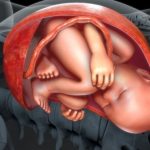Your Changing Body in the First Trimester

The first trimester in any woman’s pregnancy is a very exciting time, it is the very start of a nearly 10 month journey to create your family; and although this time goes by relatively quickly for most mothers to be, the first trimester can be a challenging time for many women.
There are many changes happening, emotionally and physically, and it can be a very demanding time in the pregnant mothers’ life.
Here we shall take a look at what you can expect in your first trimester:
Weeks 1-4
You may be surprised to know, the countdown begins before you’re even pregnant – once you have conceived, your pregnancy will be dated from the first day of your last period, and so, even though pregnancy usually lasts for an average of 40 weeks, baby has only been inside for about 38 weeks.
No Real Symptoms (weeks 1-3): For many mothers, weeks 1-3 are quite uneventful. Commonly there are no real symptoms to report this early on. Many mothers (unless they are specifically tracking their cycles) may not even know they are pregnant for a week or so.
Prenatal Vitamins
Even though you may have no physical symptoms, this is the best time to begin important steps to get you and your body ready for baby – If you have not already, this is the time to start a prenatal vitamin. Prenatal Vitamins are specifically formulated to assist a growing baby develop healthily as well as support a mothers changing body. Most prenatal vitamins are taken once a day, if you are unsure, your doctor should be able to point you in the right direction.
Things to avoid
This is also the best time to start looking in to what you should avoid during pregnancy, this can be an overwhelming list for many women, so if you are unsure, speak with your health care professional. Read more on the list of foods to avoid during pregnancy here.
Common Symptoms (around week 4): Around week 4 many women can start to feel the onset of pregnancy symptoms. Common symptoms felt around this time include:
- Bloating,
- Cramping,
- Tender breasts and
- Feeling moody etc.
This can be a little confusing for women as they are very similar symptoms experienced during PMS.
Morning Sickness
One symptom that many women hear of (and expect) is dreaded morning sickness (morning sickness affects approximately over 75% of pregnant women). This can also start around the fourth week, for some women it can be mild or not happen at all, while for others it can be quite debilitating. And don’t let the name fool you, morning sickness can happen at any time of the day or night.
Food cravings and Aversions
Something that may exacerbate your morning sickness…food cravings and aversions! Cravings and aversions are said to be experienced by over 80% of pregnant women and you may find yourself cravings things out of the ordinary. This is common and not to be worried about. Similarly something you usually enjoy may make you feel sick. If you find yourself drawn to abnormal foods (dirt, chalk etc.) speak to your health care professional.
Blood pressure changes
Moreover, the increase in the hormone progesterone may cause blood pressure changes (which is normal) as it causes relaxation of your blood vessels. If you do happen to feel faint make sure you are sitting and standing up slowly to avoid headspins. Your health care provider should check your blood pressure at each appointment to make sure it is in the safe range.
Weeks 5-8
Week 5 through 8, your baby is growing quickly, from the size of a seed at week 5 to roughly the size of a raspberry by week 8. Although only tiny, it is already starting to function, organs have begun to develop by week 5 and the beginnings of the spinal cord and brain have begun to form.
By week 8 his or hers little face is starting to become recognisable and commonly a nose, lips and eyelids can be seen.
Morning sickness continues
If you are experiencing morning sickness this will commonly continue for the rest of the first trimester and could unfortunately reappear later in your pregnancy, you may also feel a lack of libido (which if you have severe morning sickness isn’t very surprising) rest assured many women find this bounces back in trimester 2 when some of your symptoms have settled down.
Rise in HCG Levels and Resulting Symptoms
You should also be able to get a positive result on a home pregnancy test by now due to an increase in your bodies HCG levels. This can also be the start of “baby brain” where you may start to misplace things or forget what you’re doing; this foggy, fuzzy feeling is very common but if you are concerned talk to your healthcare professional.
Due to your hormone levels being on the rise you may feel more emotional, whether you’re feeling particularly moody or finding yourself tearing up numerous times throughout the day, this is your body protecting baby, allowing your placenta to function and provide for baby and helping your uterus to expand to make room for not only baby but also the amniotic fluid that will keep baby comfortable and safe while growing.
Baby Movements and Resulting Symptoms
By week 8, your baby is also starting to move around, and although you can’t feel its little twitches yet, this may coincide with an increase in using the bathroom as your womb starts to expand further and encroach on the bladders space. You may also be feeling tired, growing a baby is a big job for your body, for one, your body’s blood volume will increase by nearly 50% so don’t be surprised if you’re feeling fatigued.
Weeks 9-13
The end of trimester 1 is in sight! From weeks 9 – 13 baby will go from roughly the size of an olive to the size of a peach. This can be a highly anticipated time for new mums. After the first trimester the chances of miscarriage greatly reduce and many people use this time to tell family and friends about their impending arrival.
Reduction in previous symptoms
You may also start to feel a reduction in symptoms you have felt since the beginning of your pregnancy such as morning sickness, irritability, bloating,fatigue and tender breasts; although for some women, a few of the symptoms may continue throughout pregnancy.
Heartburn and Constipation
Heartburn and constipation are common side effects of pregnancy and if you are feeling these symptoms now it can help to take a look at your diet. Spicy foods may exacerbate heartburn so limiting these foods may help and ensure you are getting plenty of fibre and water to keep constipation at bay.
Baby’s First Heartbeat
Your baby also graduates from being medically known as an embryo to a foetus at week 10 and you will most likely get to see your baby in your first scan which is generally around the 12 week mark.You may even get to hear baby’s heartbeat!
Belly becomes prominent
Another exciting development happening around the end of trimester 1 is that, you may also start to show slightly. Up until now any bloating is generally caused by the womb expanding and the additional fluid being created.
Weight Gain
Your uterus (which was around the size of an orange prior to pregnancy) will be around the size of grapefruit by the end of trimester 1. Gaining weight which can be a confronting part of pregnancy for women, the first place you will notice this is generally your torso and upper legs as your body readies itself for carrying extra weight and baby takes up more room inside.
Increase in Vaginal Discharge
Further, due to the increase in oestrogen you may also notice an increase in vaginal discharge. This is quite normal and in fact plays a very important part in keeping your baby safe. The discharge protects the birth canal from infection and helps maintain a healthy balance of bacteria keeping baby safe until he or she is ready to be born.
Spider Naevi
If you have started to notice spider naevi (prominent blood vessels) rest assured these generally fade away after birth and are actually a good sign that your body is starting to pump around the extra blood needed to support baby.
You are now a third of the way through your pregnancy and at the end of the first trimester! The second trimester (often known as the trimester of smooth sailing) is on its way. Baby is growing and forming at a rapid rate and in around 6 months you will be able to meet for the first time.The trials and tribulations of trimester 1 will seem like a distant memory and in the scheme of things, although it may feel like an eternity whilst you’re going through it, the first trimester is such a short period of time and the most crucial part of your babies development – it will all be worth it once you get to hold your baby in your arms!


